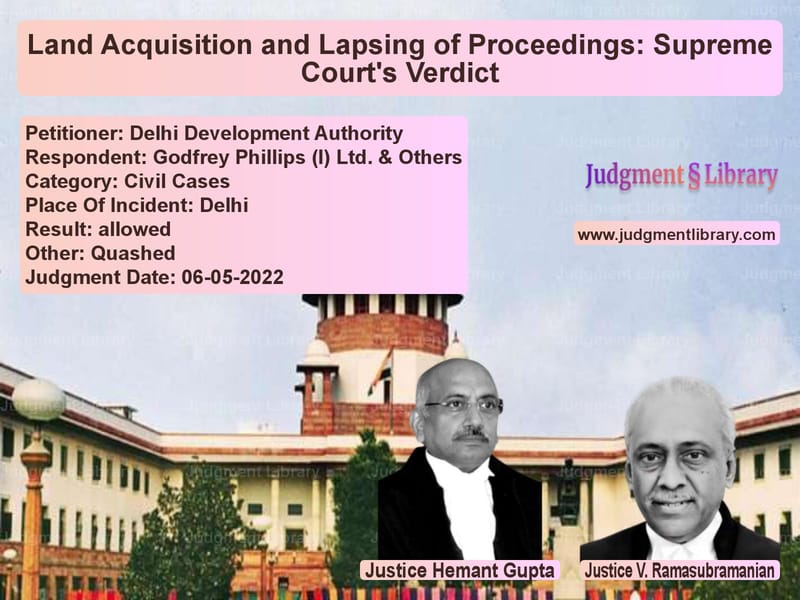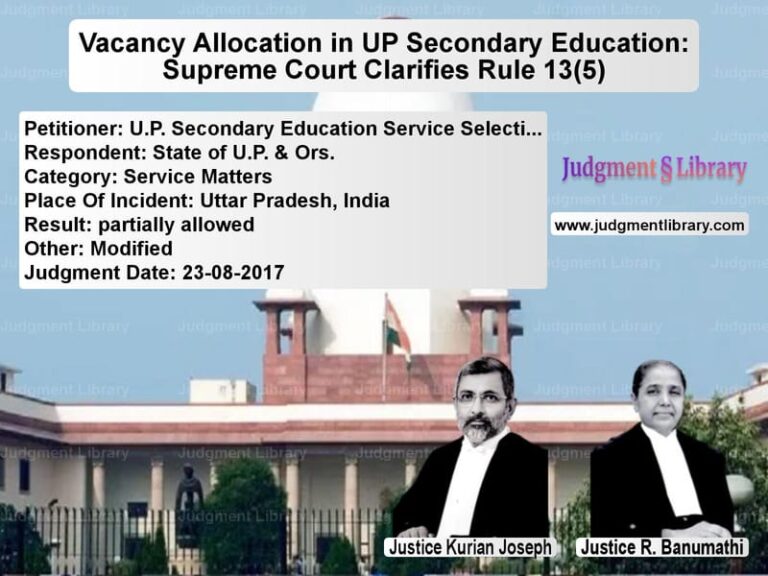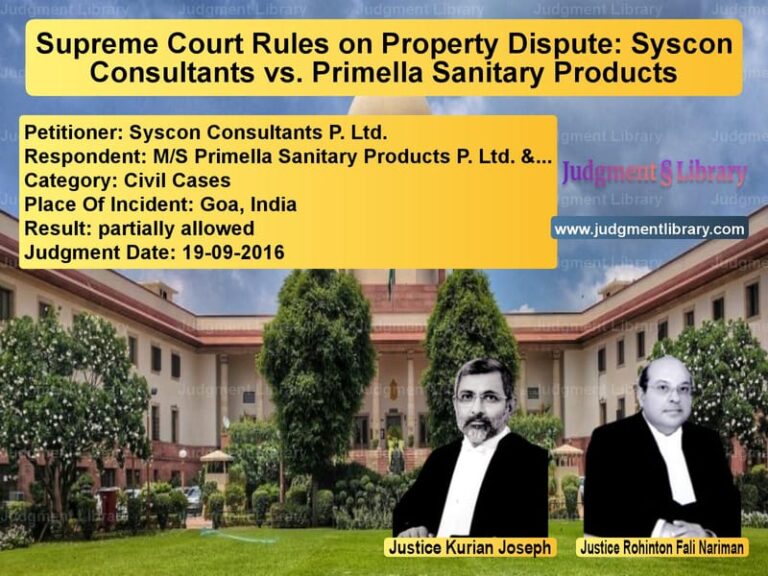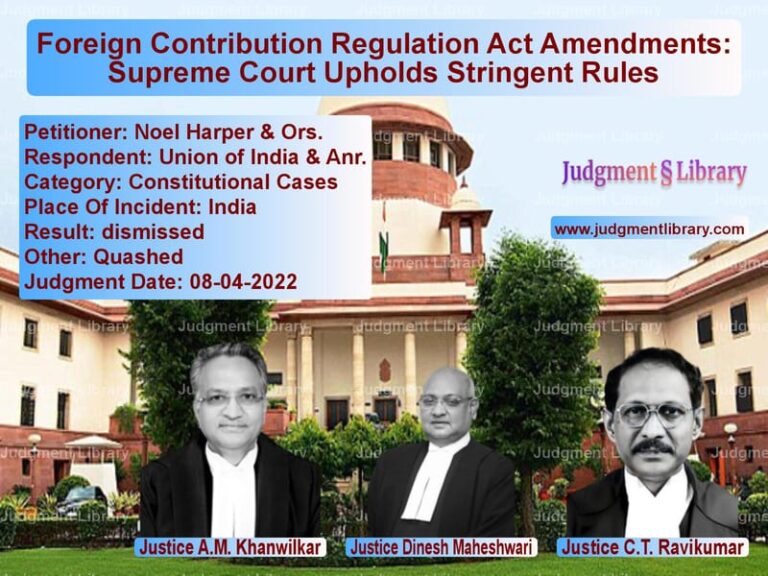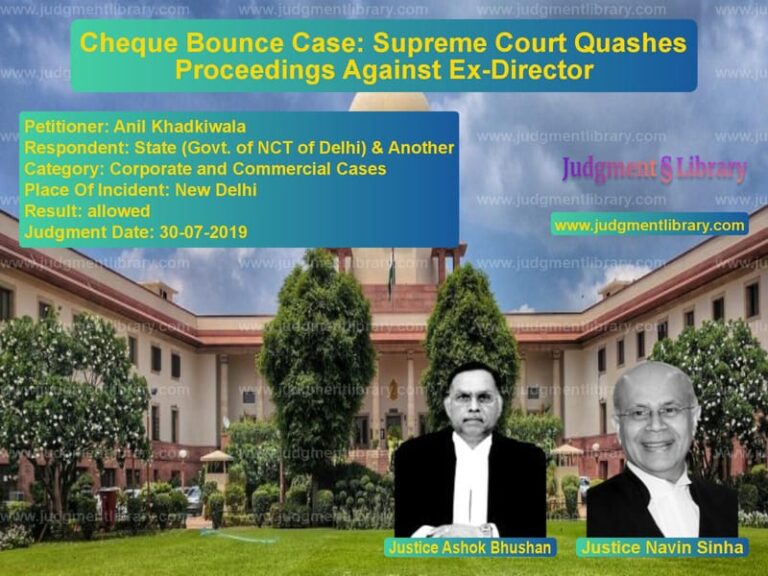Land Acquisition and Lapsing of Proceedings: Supreme Court’s Verdict
The Supreme Court of India in Delhi Development Authority v. Godfrey Phillips (I) Ltd. & Others addressed the issue of land acquisition and the lapsing of proceedings under the Right to Fair Compensation and Transparency in Land Acquisition, Rehabilitation and Resettlement Act, 2013 (the ‘2013 Act’). This judgment examined whether the acquisition proceedings initiated under the Land Acquisition Act, 1894 (the ‘1894 Act’) had lapsed under Section 24(2) of the 2013 Act.
Background of the Case
The case arose from the acquisition of land measuring approximately 50,000 bighas across 12 villages for the planned development of Delhi. The land acquisition process began with notifications under Section 4 of the 1894 Act in 1980, followed by declarations under Section 6 in 1985 and 1986. Awards for compensation were announced in 1987.
M/s. Satluj Bhatta Co., through its partners, originally owned a portion of the acquired land. They entered into agreements to sell portions of the land, which led to multiple legal disputes regarding whether the acquisition proceedings had lapsed due to non-payment of compensation and non-possession by the authorities.
Arguments by the Appellant (Delhi Development Authority)
The Delhi Development Authority (DDA) contended:
- The land acquisition process was legally completed, and possession was taken by the government.
- The original landowners had withdrawn their legal challenges in 1989, making the acquisition final.
- The land purchasers had no legal standing to claim lapsing of the acquisition.
- The Supreme Court’s judgment in Indore Development Authority v. Manoharlal established that if possession was taken or compensation was deposited, the acquisition did not lapse.
Arguments by the Respondents (Landowners and Purchasers)
The respondents, including Godfrey Phillips (I) Ltd., argued:
- The authorities failed to take physical possession of certain plots.
- Compensation was either not paid or returned by the original landowners.
- Under Section 24(2) of the 2013 Act, the acquisition should be deemed to have lapsed.
- The High Court correctly ruled in their favor, declaring the proceedings null and void.
Supreme Court’s Observations
The Bench, comprising Justice Hemant Gupta and Justice V. Ramasubramanian, analyzed the matter in light of past judgments and observed:
- The original landowners had initially challenged the acquisition but later withdrew their legal challenge, making the acquisition final.
- Merely not utilizing the land did not mean possession was not taken by the authorities.
- Compensation was either paid or duly deposited, fulfilling the legal requirements under the 1894 Act.
- The concept of possession under the 1894 Act differed from physical possession, and drawing up possession reports (panchnamas) was legally sufficient.
Key Judicial Precedents Referred
The Court relied on multiple precedents, including:
- Indore Development Authority v. Manoharlal (2020): Defined the requirements for an acquisition to lapse.
- Abhey Ram v. Union of India (1997): Held that the quashing of acquisition proceedings for some landowners does not automatically extend to others.
- Delhi Administration v. Gurdip Singh Uban (1999, 2000): Clarified that acquisition lapsing requires non-possession and non-payment of compensation.
Final Judgment
The Supreme Court allowed the appeal, ruling:
- The acquisition proceedings had not lapsed under Section 24(2) of the 2013 Act.
- Land purchasers could not challenge the acquisition once it had attained finality.
- Compensation that was paid or deposited was legally valid.
- Panchnama reports confirming possession were sufficient evidence.
Implications of the Judgment
This ruling has significant implications for land acquisition cases, particularly:
- Reaffirming that land purchasers cannot claim benefits under the 2013 Act if the original landowners had settled their claims.
- Establishing that once possession is taken and compensation is deposited, acquisition proceedings do not lapse.
- Preventing misuse of Section 24(2) of the 2013 Act to challenge long-settled acquisitions.
The judgment sets a precedent for future cases involving land acquisition disputes, ensuring that judicial interventions do not unfairly overturn finalized acquisitions.
Petitioner Name: Delhi Development Authority.Respondent Name: Godfrey Phillips (I) Ltd. & Others.Judgment By: Justice Hemant Gupta, Justice V. Ramasubramanian.Place Of Incident: Delhi.Judgment Date: 06-05-2022.
Don’t miss out on the full details! Download the complete judgment in PDF format below and gain valuable insights instantly!
Download Judgment: delhi-development-au-vs-godfrey-phillips-(i)-supreme-court-of-india-judgment-dated-06-05-2022.pdf
Directly Download Judgment: Directly download this Judgment
See all petitions in Property Disputes
See all petitions in Landlord-Tenant Disputes
See all petitions in Damages and Compensation
See all petitions in Public Interest Litigation
See all petitions in Other Cases
See all petitions in Judgment by Hemant Gupta
See all petitions in Judgment by V. Ramasubramanian
See all petitions in allowed
See all petitions in Quashed
See all petitions in supreme court of India judgments May 2022
See all petitions in 2022 judgments
See all posts in Civil Cases Category
See all allowed petitions in Civil Cases Category
See all Dismissed petitions in Civil Cases Category
See all partially allowed petitions in Civil Cases Category

